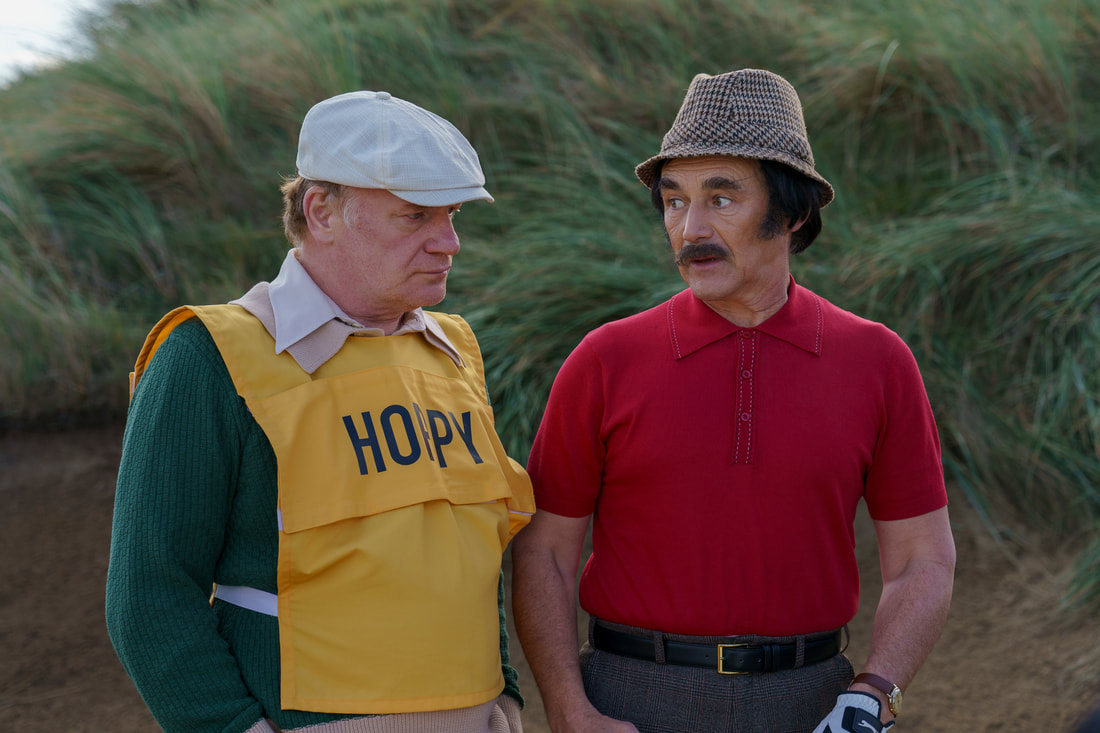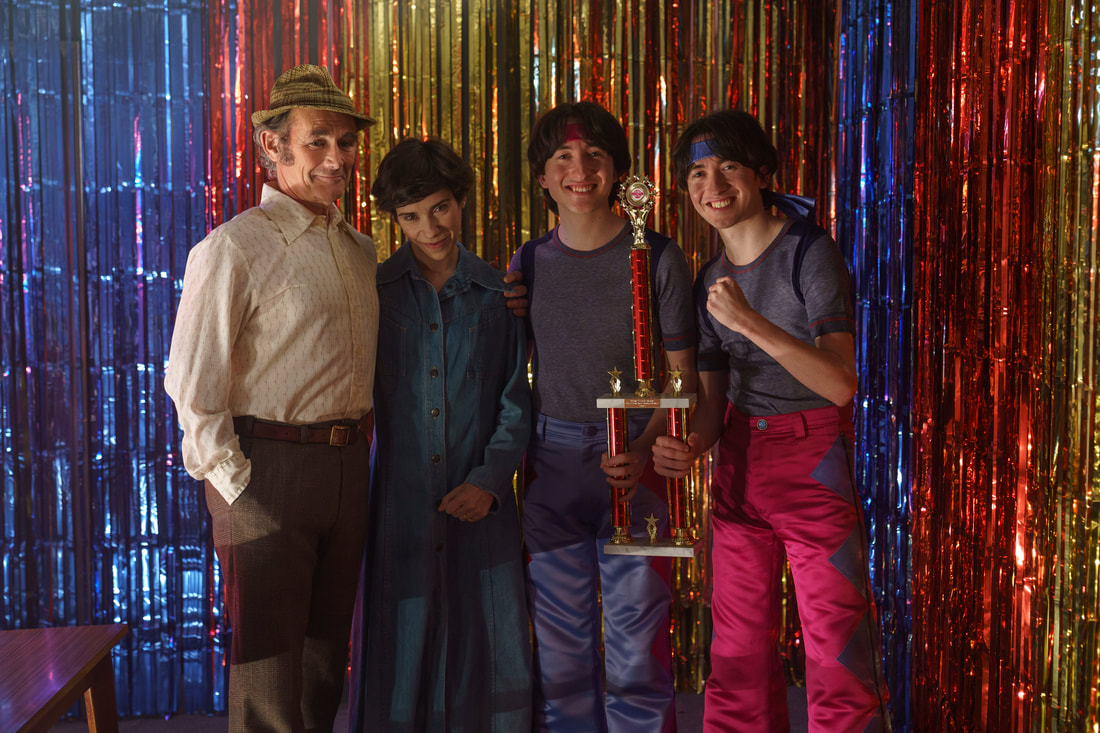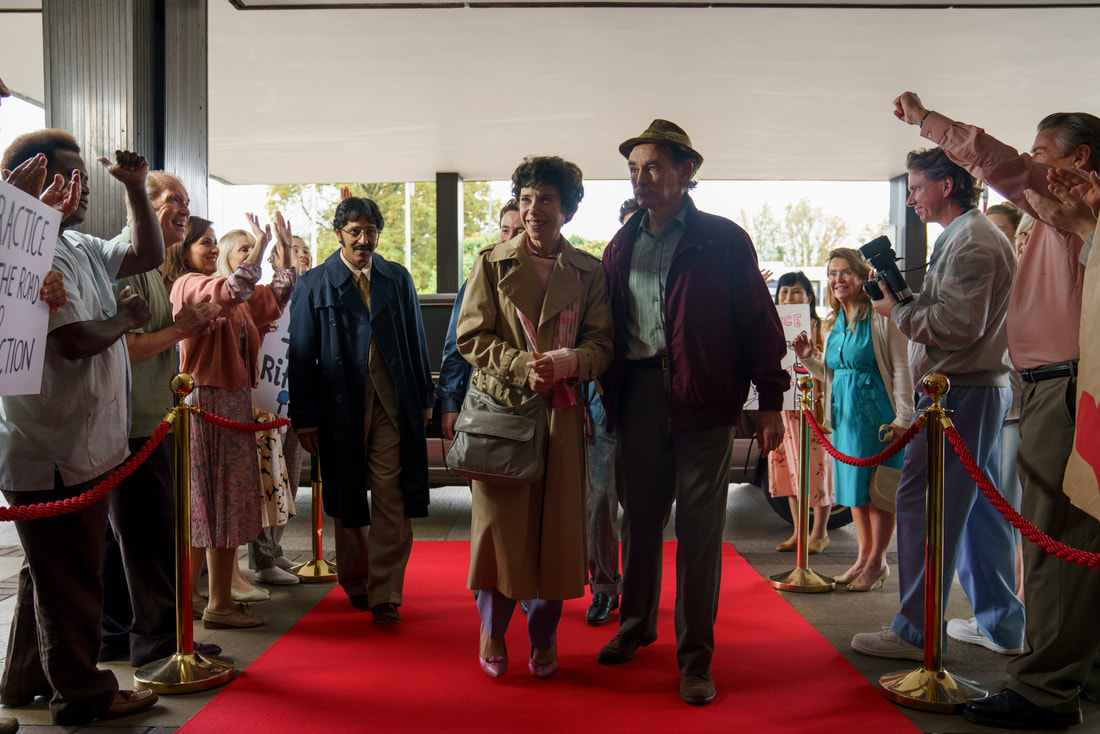|
Interview by Sean Boelman
The Phantom of the Open debuted at last year’s BFI London Film Festival to great acclaim. Written by Simon Farnaby (Paddington 2) and directed by Craig Roberts (Eternal Beauty), the film tells the unbelievably true story of Maurice Flitcroft, a man who entered the British Open despite not being a professional and ended up scoring the highest round in the history of the tournament.
We at disappointment media got the opportunity to talk with Farnaby and Roberts in advance of the film’s release. We talked about golf movies, the Flitcroft family, Paddington 2, and more. Check out the interview below and make sure to see The Phantom of the Open in theaters beginning June 3. On Golf in The Phantom of the Open
disappointment media: So what are some of your favorite movies that feature the sport of golf?
Simon Farnaby: Oh, good question. I mean, Caddyshack is probably my favorite. Yeah, but Craig and I disagree a lot over Happy Gilmore. I usually love all the films that Craig loves, but I really hate Happy Gilmore. And I think I hate you because I don't think it's a golf movie. I think it's a hockey movie. Craig Roberts: Yeah. I think you're right. If you look at it that way, it's brilliant. Farnaby: But I'll tell you something, which is that I grew up around golf and I love golf, and always sort of wanted a good golf movie that did golf some justice in terms of this sort of competition of it. I mean, Tin Cup got pretty close. But I always went, "Why do these courses look so shit?" Like they don't look like that. Championship courses look a particular way. And they never ever look like that on screen. And when we shot this movie, I realized why. Which is because no members will let you shoot on their course, no matter how much money you throw at them. Because they just don't want their golf club to close for even like half a day. Roberts: And it makes it difficult because you also can't get the equipment onto the greens. That was certainly a challenge. Farnaby: So I really had a lesson there on why they look like that. I mean, actually one of the courses looks great. On the Lynx course, Danny Kent looks amazing. Although the wind was howling, and no one could stand up. disappointment: Something in a film like The Phantom of the Open, you actually kind of have to make the sport scenes look unprofessional, because it's about someone who is not very good at golf. Was this a challenge? Roberts: Well, it's just him that's not very good. So I suppose the biggest challenge with golf is that if you love golf, which a lot of people do, then it's fantastic. But then a lot of other people don't love golf as well and they find it boring. So for us, it was about keeping it interesting and entertaining. And you know, somebody who stood in the middle of a green field can get boring very quickly. So we just wanted to make sure, I suppose, that the camera moves and all that just matched his energy, you know, and his drive. And that was difficult keeping that going. Farnaby: Actually, you know, showing bad golf is easier than showing good golf because of the shortness of the shot. Roberts: That's true actually, yeah. Farnaby: Sometimes what people struggle with watching golf on TV is that you can't see where the ball is going. Because they hit it so far. But Maurice didn't do that. So we didn't have to deal with that problem. On the Flitcroft Family
disappointment: Something else that I loved about The Phantom of the Open is that just as much about family as it is about golf, how did this theme resonate with you?
Farnaby: Yes, it was. You know, Maurice and his wife, Jean had a very special relationship and the boys, you know, the twins and Michael, Maurice's stepson. So, in a way that was, as a screenwriter, the thing to get right. It's not really about golf, it's about a family, you know, and those characters and how they interact and what their sort of family philosophy is, and all that sort of stuff. And then when Craig came aboard, Craig was really into all that as well. And even more and going look, let's get this relationship right. And then getting Sally Hawkins, who can really hold up. In real life, Jean was Maurice's rock, and Sally managed to do that sort of brilliantly. So yeah, it's a good spot. It's very much about family. Roberts: The way I look at it is that it's about somebody who's trying to defy the odds that he's given. You can't do that without his family at all. And certainly without Jean. I think as confident he is that he wants to do it, I think she believes in him more than he probably does as well. So that's a really powerful thing to have, you know, and it's helped many, many people throughout history. I think that's important to reflect. disappointment: So one of my favorite bits in the film was the Fantastic Flitcrofts, the dancing twins. How did you go about incorporating this absurd and charming duo into the film? Farnaby: Well, it was a great thing to have because they were genuinely world champion disco dancers, you know, Maurice had this philosophy that you see in the film of you know, just try and it doesn't matter if you fail. And they, in a way, are a part of that debate because they did try and then they succeeded. But they succeeded at something that had a very short life span, which was disco dancing, which died in the mid '80s. So it was great to have that because a film is kinda like a debate, sometimes I think, and it's good to have all the different elements of that. And they were part of that, and it was real, I was lucky enough to meet them. I mean, James is still alive and is in the film, actually. But I met Jean and James together when I first did the research for the movie, and they're really amazing characters and actually danced everywhere that they went and make a cup of tea and they go and dance. Roberts: Christian and Jonah, we were very lucky to get them to be honest. We were about five weeks out from shooting, and I was panicking. But as soon as I saw the video, they sent a kind of an improv dance and then some acting self tape. And first off, they look like I don't know if you know the band The Last Shadow Puppets? It's Alex Turner and Miles Kane. And they kind of look like them. Like a funny version. Loved that. And then I Skyped with them when they got out. And I just love their energy so much. It kind of you know, that's how Boogie Nights feels. disappointment: And I mean, as a whole, I think the cast in the film is phenomenal. I mean, you have Mark Rylance, Sally Hawkins. What was it like working with the cast to bring the Flitcrofts to life? Roberts: It was a dream. It's the hardest part of the process, getting that right. Because, you know, you can shoot on the best cameras in the world. But if you don't have good actors, your movie's doomed. If you have a great actor or an iPhone, it's going to be a better movie. So getting that right is hard. But really satisfying once it comes together. When it came together for me was actually when we did a bunch of rehearsal for that. I never really rehearse to get it right. It's kind of to get it wrong and get all that out, really. But when it came to the first thing we had as a family, it was the scene where everybody was talking over each other. The dog was barking. And I kind of said to the actors that I kind of want it to feel like Uncut Gems, that Safdie Brothers movie. Just complete chaos. And weirdly, because they all could just talk over each other. I think it was very freeing for them. You could feel the chemistry and they all came together in that moment. disappointment: So do you have a favorite alias that Maurice Flitcroft used? Farnaby: Oh, God, I mean, Arnold Palmtree obviously, and I do think Count Manfred von Hoffmanstel. Like why put Count on it? And what Count has ever played golf? I mean, I've never seen Count in front, like that was an odd one. But Gene Paycheki-- Roberts: That's pretty good as well. I like Hoppy. Gerald Hoppy. On Paddington 2 and Heartwarming Stories
disappointment: Mr. Farnaby, Paddington 2 is a pop culture phenomenon. It was even a plot point in The Unbearable Weight of Massive Talent that came out this year. But did you ever expect that film to be such a smash?
Farnaby: No. Actually, I haven't seen the film yet, The Unbearable Weight of Massive Talent. [to Roberts] Have you heard about this? Roberts: No, I didn't. Farnaby: I'll show you it in a bit. I've got it on my phone. And somebody sent me a clip of it. And both Paul King and I had a little chat and said it was almost the thing that made us most proud of the movie. Because like you say, it's become pop culture. And I had so many texts, and for so many people, that's their favorite bit of the movie. But we knew that the plan was to try and make two better than one. That was the goal we gave ourselves. And it was quite a hard thing to do, because it was really loved the first one. And so we really gave ourselves a tough job. But you know, it took us about two years to write it. And I think we put in a lot of effort. So it was nice to see it sort of come off. Maybe that's just how long you need to spend writing films. disappointment: Well, like Paddington 2, I would say The Phantom of the Open is like this heartwarming, crowd pleasing, inspiring story. What stands out about these types of stories to you? Roberts: Well, for me, it's escapism, isn't it? That's the important thing. I think cinema at its core, sure, should reflect society and all that stuff. But I go to the cinema to escape and to feel good. It's the kind of the Spielberg/Kubrick debate where you can go to a Kubrick movie and come out questioning the world and yourself, or you got to a Spielberg movie and come out and feel great and warm. And at this time in my life, I want to feel warm. And I think that's what's important. Farnaby: Yeah, and I like characters that sort of reflect our fears, but don't have the same sort of reactions to them. For example, you know, I think we're all slightly frightened of failure, you know. And I say this to my daughter who's eight all the time, she tries things and is sort of scared to fail. And it's really important to go, it doesn't really matter if you fail, or like, somebody said, "Failing is success, part one," or something I don't know. I think I just said it, I forgot the quote. Craig and I even talked about The Big Lebowski, we both love The Big Lebowski, and that's got bowling in it, and this does golf. And as a character, he's sort of confident in his own lifestyle. And is fine with it, you know, and Maurice just went for it. He had this character that was like, "I'm gonna take my dream, and I'm gonna go for it, no matter what people think of me." And that's something that I think we like to see, you know, because we're so frightened of it ourselves. And we like to see people doing that and we can laugh and cry at that person, because it's a real hero's effort to do that, you know? Whereas most of us just go, "I'm not going to try anything in case I fail." On Executing the Film
disappointment: Mr. Farnaby, you adapted the script from the book that you co-wrote, what was that process like for you?
Farnaby: Yeah, it was fine. Because I'd written the screenplay before I wrote the book, actually, and the screenplay was not very good. And then I did the book. You know, everyone should write a biography first, if they're gonna do a screenplay, because you just find out so much stuff. You know, you've got to do 50,000 words on one person. And then it's just a case of, I call it kind of like curating those elements into what I know about crafting screenplays. So it's actually a much easier process than doing straight fiction, which can go in any direction. And you just have to keep going down blind alleys. But this had lots of elements. I mean, the main difference to the bullshit screenplay I wrote, and the final one was, was finding an ending, because it's quite hard to write a sports movie where the person doesn't get any better at the sport. But what he does is find success in another way. And his sort of trip to the USA, was something that nobody knew about. It wasn't in the obituaries. And it wasn't in the newspapers. And that was all from digging in and going and doing research. And that gave us the end to the movie without giving too much away. Yeah, like you say it was once I'd sort of gone through the pain of researching and writing the book, the screenplay was fairly straightforward. disappointment: I want to talk a little bit about the dream sequences in the film. I thought they were gorgeous. What went into creating those? Roberts: Well, they were there already to be honest, they were in the script. The whole Starry Night aspect of it was there. So it was basically finding a good team that could execute it and bring that to life. And finding the right color palette for it all really. It was important, I think the escapism of it all. He wanted to, you know, to break out and do something that the people were telling him he couldn't do. So I think they're important to have in there. And when I read it, that's what really attracted me to the script. It kind of felt like The Big Lebowski, him walking up the steps. So that was really fun. Farnaby: Yeah, I mean, Craig's being very modest. I wrote those because I wanted them and it was like a Billy Liar type thing. But that's why I'm not a director, because I wouldn't have had a clue. I was like, that's what I want. There's a dream sequence. But I didn't have a clue how to do it and actually created it brilliantly. I mean, even when he's on the tee and he hits his shot. And you see it from the ball's eye point of view. I was like, I have no idea how I was gonna do this, but I believe Craig pioneered a new type of shot, right? Roberts: I didn't need to, I took it. Farnaby: Oh you stole it? Roberts: Yeah, from Simon's favorite film. I took it from Happy Gilmore. [They laugh]
The Phantom of the Open hits theaters on June 3.
0 Comments
Leave a Reply. |
Archives
March 2024
Authors
All
|
|
|
disappointment media
Dedicated to unique and diverse perspectives on cinema! |



